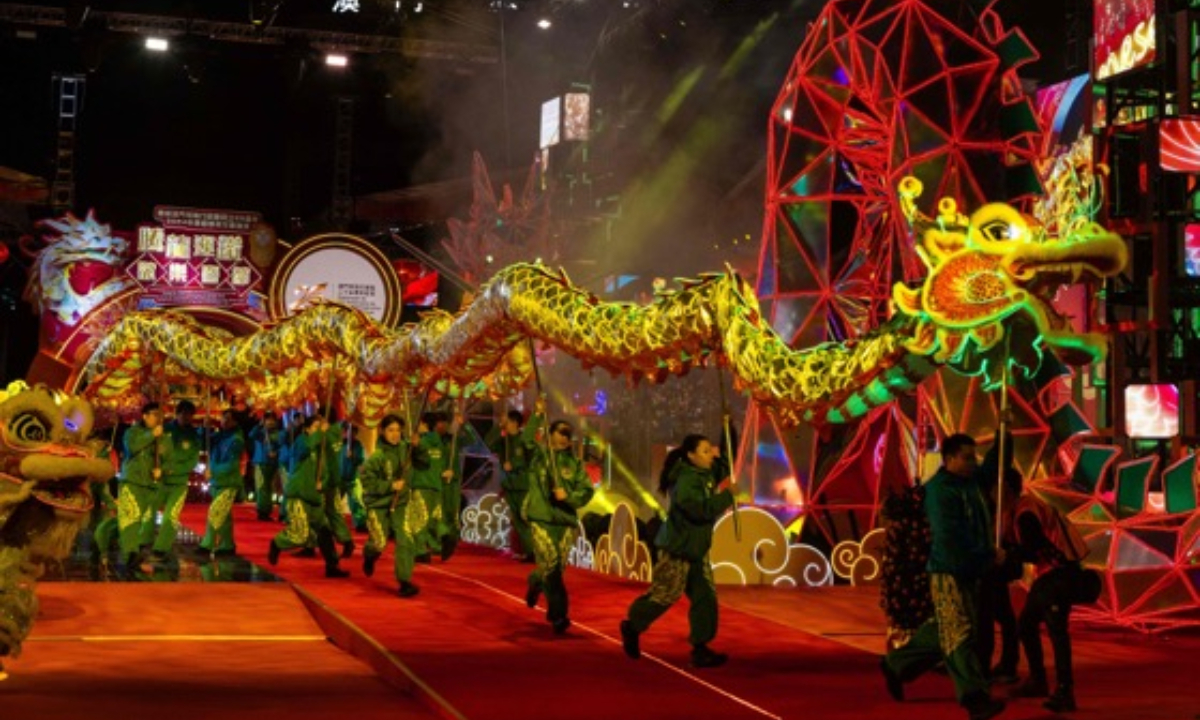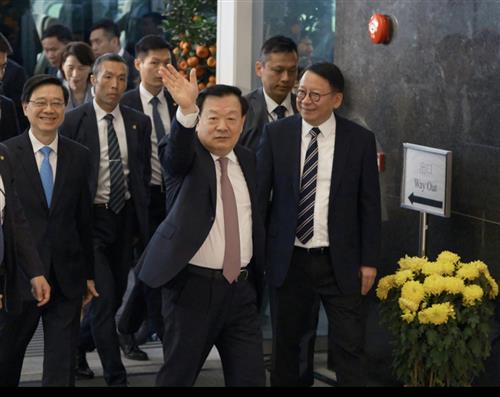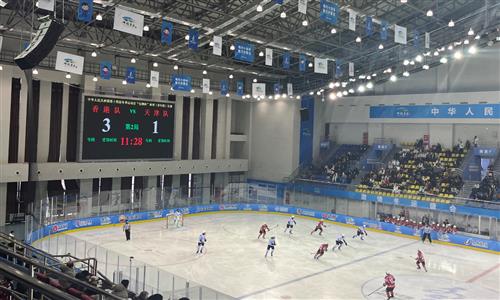Stability unlocking economic potentials: Mainland tourists visiting HK, Macao for Chinese Lunar New Year surpass same period of 2018

Participants take part in a Year of the Dragon parade during celebrations for Chinese Lunar New Year in Macao Special Administrative Region, on February 12, 2024. Photo: VCG
Hong Kong and Macao have both announced relevant data to prove that their tourism industries have all recovered to the level before the COVID-19 pandemic and also the 2019 turmoil, as the two special administrative regions all received more than 1.4 million and 1.3 million inbound visitors which greatly boost local economies, and experts and professionals of related industries said security, stability and public order are the most important elements to bring tourists back.
Macao, with only about a population of 686,600, can receive almost the same amount of tourists as Hong Kong, which has a population of more than 7 million and a bigger area of land. Some analysts said that apart from those unique tourist resources of the city, a key reason to its attraction is that Macao had already finished the national security legislation of its Basic Law long ago, so tourists now have more confidence in the city, and when Hong Kong finishes its long-awaited Basic Law Article 23 legislation, it will also have sustainable peace and its economic potentials will be further unlocked.
According to the website of Hong Kong Special Administrative Region (HKSAR) Government, during the eight-day Chinese Lunar New Year golden week, the Hong Kong Immigration Department preliminarily recorded a total of around 1.436 million inbound visitors to Hong Kong, of which around 1.255 million mainland residents visited Hong Kong through various sea, land and air control points. The daily average of mainland visitors was around 157,000, which exceeded that of the May Day Holiday and National Day Golden Week in 2023 by 25.3 percent and 14.9 percent respectively. The number of daily mainland visitor arrivals also exceeded the daily average of the same period in 2018.
In Macao, according to the local government, the city received 1.358 million inbound visitors during the national holidays, among which 1.03 million were from the mainland, with the data of daily average surpassing 129,000, and this sees a 243 percent growth compare to the Chinese Lunar New Year national holidays in 2023.
Make everything easier
Some Western media outlets have consistently badmouthed Hong Kong's economy since the introduction of national security law for Hong Kong by the central government in 2020, but the current recovery proves that these outlets have repeatedly failed to understand and explain Hong Kong's past, present and future, said experts.
Professionals in the Hong Kong tourism industry said that the national security legislation for Hong Kong has played a key role of stabilizer in ending turmoil and restoring public order. They believe that this legislation is the precondition for the current successful recovery.
They called for the successful completion of the Basic Law Article 23 legislation as soon as possible this year, so that it can provide sustainable peace within the society and contribute to long-term economic recovery.
The Global Times reporter found in Macao that many people came to the city for shopping, gambling and vacation and were not staying in the city overnight as the hotels in the city were extremely busy and expensive. The developed transportation infrastructure makes it possible for them to have a day round trip between Zhuhai of Guangdong Province and Macao.
Kevin Lau, a professional of tourism and a member staff who worked at a casino in Macao, told the Global Times that "Not just tourists, the people like us, who work and live in Macao, also can enjoy a day round trip between the mainland and Macao. More and more people are going to Zhuhai to buy houses to improve their families' living standard, and make the daily trip to Macao to work, and sometimes we also go to Hong Kong for fun or business."
"This is becoming a life style of the Guangdong-Hong Kong-Macao Greater Bay Area," Lau said. When the people-to-people exchange becomes easier and frequent, the mutual-respect, mutual-understanding and friendship will be increased automatically, and "In 2019, I couldn't imagine this change, and now, just a few years later, many things have recovered, so I do have confidence that everything will be better and better in the future."
Timothy Chui Ting Pong, executive director of Hong Kong Association, told the Global Times that "I still remember in 2019, when I came back from Guangzhou, I was the only passenger on the train heading to Hong Kong. Due to the turmoil, all visitors, from the mainland or other countries, have all deleted Hong Kong from their list for traveling."
"Today, the nightmare has long gone, but we Hong Kong residents need to learn lessons from it. Hong Kong is an international financial center, and a crucial international transportation hub, so we do have a responsibility to safeguard national security and deal with the threat from hostile forces," Chui noted.
Dicky Yip, chairman of the Hong Kong Tourism Practitioners Union, told the Global Times on February 16 that "today, Hong Kong does not have as many advantages compared to other major cities in China in terms of urban landscape. In some cases, mainland cities are even more developed and advanced than Hong Kong, but we still possess special cultural characteristics as Hong Kong has always played a role in connecting the world and China."
This is why tourists are still interested in Hong Kong and are attracted by the special cultural and sports events organized in the city, but due to the high cost, many tourists from the mainland prefer to have a one-day tour or day round trip, according to Yip.
Safeguard the recovery
The national security legislation implemented by the central government for Hong Kong in 2020 played a significant role in restoring stability and public order in the city, as "it has brought confidence to Hong Kong residents and our mainland compatriots, allowing everyone to feel proud when walking the streets of Hong Kong and free from bias, discrimination, ideological extremism and dangers," Yip noted. He hopes that the Basic Law Article 23 legislation can be completed by 2024, as this is not only beneficial for tourism, but also helps guarantee sustainable peace and stability for everyone in this city.
Wang Huiwen, a 36-year-old mainland tourist from Hunan Province, brought his family to Hong Kong during the national holidays. He told the Global Times on February 16 that "Hong Kong today shows a much more peaceful and stable image to everyone, and people are friendlier and more confident."
"The only problem is that there were too many people in almost every scenic spot and everything is more expensive than on the mainland. My wife told me that maybe we can come back another day when it's not peak tourist season," Wang noted.



